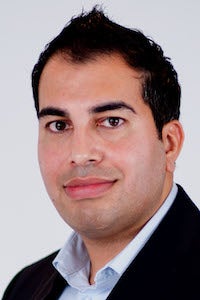
Lawyers always hear that their skills are transferable — whether they want to pivot to a role in technology, operations, or both. But how does a legal degree translate to CEO material? As the general counsel of IT firms Infosys and Atos IT Solutions and Services Inc., Fayiaz Chaudhri has gained the managerial, budgeting, and strategic skills needed to become CEO of AIMACTEK, a startup that specializes in machine learning platforms. Chaudhri relates how his varied professional experience and legal acumen gave him an edge to join the C-suite and eventually run the show.
Noah Webster: How does it feel to be a new CEO?

Fayiaz Chaudhri: Incredibly proud, yet a little overwhelmed. As a CEO of a startup, the success or failure of the company — therefore the fate and fortune of investors and the employees — all rest on your shoulders. Being the ultimate decision maker and knowing that every decision impacts your employees and their families adds a deep sense of responsibility that isn’t present in other positions.
At AIMACTEK, we are revolutionizing the legal landscape with our machine-learning platform. I have to persuade lawyers to adopt my service and then change how they work. Having a great product helps, but changing a potential customer’s mindset is still a unique challenge.
Webster: When did you become interested in taking a business position?
Chaudhri: The skills we learn as lawyers are transferable to an executive position. We are taught to be logical and analytical when solving problems and to efficiently absorb, review, and comprehend a tremendous amount of data. Both are transferable and required for acting in an executive capacity.
During my last few general counsel positions, I was part of the executive board. Being part of the strategic decisionmaking and direction of the company gave me the confidence to know that taking a business position was a realistic career path.
Webster: How does your legal experience give you an edge?
Chaudhri: AIMACTEK's product is a machine learning platform for the legal industry to search, review, perform risk analysis, and markup contractual documents. As such, being able to relate to the issues faced by lawyers through personal experience is key to selling the platform to our prospective customers.
My 20-year legal experience has helped me have a thorough understanding of our prospective market. It allows me to make informed strategic decisions that an individual without the same firsthand knowledge may not fully contemplate.
Webster: Different paths are available, such as taking responsibility for other departments, general manager for a division, or founding a startup. What did you map out for yourself? Is there a path you recommend?
Chaudhri: For me, it happened naturally. I had spent nearly two decades as a lawyer and GC, and I was presented with the opportunity to run a startup in the legal field. It seemed an easy transition. I personally think it is important to have solid financial skills, a degree of creativity, and an ability to see the bigger picture without being bogged down in minutia. Developing these skills through your work as GC is important.
Also, I think having some sort of operations role makes a GC an attractive CEO candidate. In an ideal world, a GC would have transformed a legal department, moved to an operations role in which they were responsible for delivery and budget, and from there be considered for the top job.
Webster: Knowing the numbers is important to understanding whether you will be cash-flow positive. How did you develop expertise in finance?
Chaudhri: I have always been responsible for budgets throughout my career. My education gave me a strong mathematics background. And I was lucky — my father was a chartered accountant running his own practice and I worked for him as a summer job. I didn’t know it at the time, but this experience would come in very handy 25 years later.
Webster: AIMACTEK is a tech company. What is it like to oversee a team of developers?
Chaudhri: My background has helped a lot in this arena too. My first degree was in engineering, and I spent most of my legal career in the technology sector. Understanding technical discussions is much easier for me because of my technical background.
Webster: Any additional advice for lawyers who are aspiring to a CEO position?
Chaudhri: Show you can develop and retain a team, prove you are not stuck in your ways and are willing to embrace new ways of working, show you are technology savvy, and try to move into an operations role if you aspire to be a CEO.




